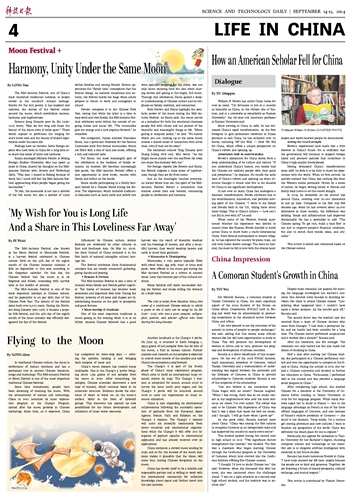
The Mid-Autumn Festival, also known as the Moon Festival or Mooncake Festival, is a harvest festival celebrated in Chinese culture. Held on the 15th day of the eighth month of the Chinese lunisolar calendar, it falls on September 17 this year according to the Gregorian calendar. On this day, the Chinese believe that the moon is at its brightest and fullest, coinciding with harvest time in the middle of autumn.
The Mid-Autumn Festival is one of the most important holidays in Chinese culture, and its popularity is on par with that of the Chinese New Year. The history of the festival dates back over 3,000 years. During the Northern Song Dynasty (960-1127), it became a popular folk festival, and the 15th day of the eighth month of the lunar calendar was officially designated the day of the festival.
Influenced by Chinese culture, similar festivals are celebrated by other cultures in East and Southeast Asia. On May 20, 2006, the State Council of China included it in the first batch of national intangible cultural heritage list.
The festival celebrates three fundamental concepts that are closely connected: gathering, giving thanks and praying.
-Reunion & Fortune
The Mid-Autumn Festival is also a time of reunion when family and friends gather together. The theme of reunion has become more prominent and important with time. During the festival, lanterns of all sizes and shapes are lit, symbolizing beacons on the path to prosperity and good fortune.
-Moon worship & Gratitude
One of the most important traditions is moon-gazing in the evening when it is at its fullest. Ancient Chinese believed that a good harvest was the result of favorable weather and the blessings of heaven, and after a bountiful harvest, they would worship heaven and earth to show their gratitude.
-Mooncakes & Thanksgiving
Mooncakes, a rich pastry typically filled with sweet bean, egg yolk, meat or lotus seed paste, were offered to the moon god during the Mid-Autumn Festival as a tribute in ancient times. Later they became part of the cultural tradition.
Many families still make mooncakes during the festival and shops selling the delicacy do a brisk trade.
The title is taken from Shuidiao Getou (the name of a traditional Chinese melody to which a poem in the cí style can be sung) by Su Shi (1037 - 1101), who was a poet, essayist, calligrapher, painter, and scholar-official who lived during the Song dynasty.







